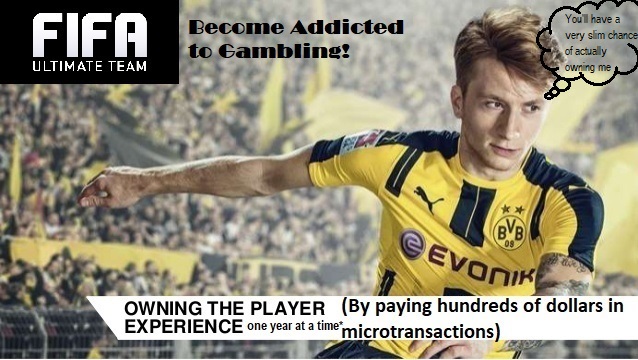Original Advertisement:

Electronic Arts’ (EA) FIFA 17 advertisement promotes “owning the player experience” in their game mode “Ultimate Team”. This suggests that owning a copy of the video game will allow you to replicate the thrill and excitement that real soccer athletes experience. A large component of the game and the most popular game mode is called “Ultimate Team”, where purchasers of the video game can build rosters in hopes of building and managing the best soccer club in the world. EA promotes building your dream squad by collecting superstar players and trading players on their online in-game market.
The problem with this advertisement is that it is misleading and can trick buyers, especially children. What the advertisement fails to mention is that building your dream roster will cost owners of the game upwards of hundreds of dollars. This is because players are collected through card packs where there is a random chance of collecting superstar soccer players. With hundreds of professional soccer players in the system, EA makes sure that the superstar players have a rare collection rate, enticing their fan base to purchase more card packs using real money. Similar to gambling, purchasers of the game easily become addicted to purchasing these micro-transactions just to “own the player experience”.
I myself got caught up in EA’s system. As a huge soccer fan myself, I would consistently spend money to try and open a “Cristiano Ronaldo” or “Lionel Messi” and have them on my team’s roster. What makes matters worse is that EA releases a new FIFA game every year. This means that every year purchasers of the FIFA series will have to start from scratch. This clever cash grab model has made EA millions of dollars as FIFA is the most popular sports game in the world.
Jammed Version of Advertisement:

My jammed version of EA’s FIFA 17 advertisement reveals the truth behind “owning the player experience”. Mockery is used to create a negative vibe of the product being sold.
This new version of the ad exposes EA’s cash grab model by letting the audience know that they would have to spend hundreds of dollars in microtransactions to fully build their dream squad in Ultimate Team. This advertisement does not shy away from letting buyers who hope to own “Marco Reus”, the cover athlete of FIFA 17, know that there is a very slim chance of actually owning a player of his status. As this mode is the most popular aspect of all FIFA games, this piece of information is vital for purchasers of the game who hope on truly building their ultimate team. Children have even been caught using their parents’ credit cards, spending hundreds to even thousands of dollars on player packs.
The jammed version of the advertisement also lets buyers know that Ultimate Team is being compared to real life gambling, where people are becoming addicted to investing real money in hopes of opening a rare and valuable player for their team.
With an asterisk, this version of FIFA’s ad also acknowledges that “owning the player experience” is a year to year investment. Once the next FIFA game comes out in September, all of the players acquired through purchasing card packs will be worthless. Buyers will have to start from scratch each year to build a new ultimate team!
In conclusion, my alteration of FIFA’s advertisement aspires to provide buyers the necessary knowledge when purchasing FIFA 17. The changes that were made poke fun at EA and expose their cunning money grab formula. The jammed version of the ad lets buyers know that they will likely have to spend hundreds of dollars through microtransactions on top of purchasing the actual copy of the video game to really “own the player experience”.